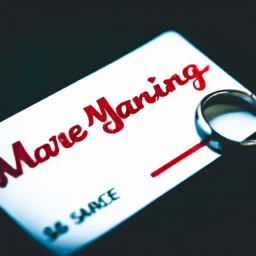Marriage is a sacred bond that brings two individuals together in a lifelong commitment. However, as time passes and challenges arise, even the strongest marriages can find themselves on the brink of collapse. This is where the importance of taking proactive steps to save the marriage becomes evident. In this blog post, we will delve into the various strategies and techniques that can help couples navigate through rough patches and rekindle the flame of love. Whether you are experiencing communication issues, trust problems, or simply feeling disconnected from your partner, this guide aims to provide you with practical advice and insights to save the marriage and build a stronger, happier future together.
The Importance of Communication in Saving a Marriage
Marriage is a beautiful union between two individuals, but it can also face its fair share of challenges. One of the most crucial elements in saving a marriage is effective communication. Communication serves as the foundation for understanding, resolving conflicts, and building a stronger bond. In this article, we will delve into the significance of communication in saving a marriage and provide you with a step-by-step guide to improve communication within your relationship.
Understanding the Role of Communication
Communication is the lifeline of any successful relationship, and it becomes even more critical when a marriage is going through a rough patch. It involves both verbal and non-verbal cues, such as body language, tone of voice, and active listening. Effective communication allows partners to express their needs, concerns, and emotions openly, fostering a sense of trust and understanding.
When communication breaks down in a marriage, misunderstandings arise, and conflicts escalate. Lack of communication often leads to resentment, emotional distance, and even the breakdown of the relationship. Therefore, it is essential to prioritize communication and make it a central focus in saving your marriage.
To improve communication, start by creating a safe and non-judgmental space for both partners to express themselves freely. Encourage open dialogue, active listening, and empathy. Remember, effective communication is a two-way street, and it requires effort and commitment from both individuals.
Identifying Communication Barriers
Before addressing communication issues, it is crucial to identify the barriers that hinder effective communication within your marriage. These barriers can include:
1. Lack of Active Listening: Often, partners are more focused on formulating their response rather than truly listening to what the other person is saying. Active listening involves paying full attention, maintaining eye contact, and acknowledging the speaker’s feelings and emotions.
2. Emotional Reactivity: When emotions run high, it becomes challenging to communicate effectively. Reacting impulsively, becoming defensive, or shutting down during conversations can hinder productive communication.
3. Poor Timing: Choosing the right time and place for discussions is crucial. Bringing up sensitive topics during moments of stress or when the other person is preoccupied can lead to further misunderstandings and conflicts.
By recognizing these barriers, you can actively work towards overcoming them and improving communication within your marriage.
Developing Effective Communication Skills
Now that you understand the significance of communication and have identified potential barriers, it’s time to develop effective communication skills. Here are some steps you can take:
1. Practice Active Listening: Make a conscious effort to listen actively to your partner. Put aside distractions, maintain eye contact, and provide verbal and non-verbal cues to show that you are fully engaged in the conversation. Reflect back what your partner has said to ensure understanding.
2. Use “I” Statements: When expressing your feelings or concerns, use “I” statements instead of blaming or accusing your partner. This approach helps to avoid defensiveness and encourages a more constructive conversation. For example, say, “I feel neglected when we don’t spend quality time together” instead of “You never make time for me.”
3. Practice Empathy: Put yourself in your partner’s shoes and try to understand their perspective. Show empathy by acknowledging their feelings and validating their emotions. This helps create a safe space for open and honest communication.
4. Choose the Right Time and Place: Timing is crucial when discussing sensitive topics. Find a time when both partners are calm and receptive. Choose a quiet and comfortable environment where you can have an uninterrupted conversation.
5. Seek Professional Help: If communication issues persist despite your efforts, consider seeking the guidance of a professional marriage counselor or therapist. They can provide valuable insights, tools, and techniques to improve communication and save your marriage.
Remember, improving communication takes time and effort. Be patient with yourself and your partner as you navigate through this process. By prioritizing communication and actively working on it, you can strengthen your bond, resolve conflicts, and save your marriage.

Effective Strategies for Rebuilding Trust in a Marriage
Trust is the foundation of any successful marriage. When trust is broken, it can lead to a breakdown in communication, emotional distance, and even the potential end of the relationship. However, rebuilding trust is possible with the right strategies and commitment from both partners. In this article, we will explore effective strategies for rebuilding trust in a marriage.
1. Open and Honest Communication
Communication is key when it comes to rebuilding trust in a marriage. Both partners need to be willing to openly discuss their feelings, concerns, and fears. It’s important to create a safe space where each person feels heard and validated. This means actively listening to your partner without interrupting or becoming defensive.
When discussing sensitive topics, it’s crucial to use “I” statements to express your emotions and avoid blaming or criticizing your partner. For example, instead of saying, “You never listen to me,” try saying, “I feel unheard when I share my thoughts and emotions.” This approach allows for a more constructive conversation and helps rebuild trust.
Additionally, it’s important to be transparent and honest about past mistakes or betrayals. Concealing information or lying will only further erode trust. By being open and honest, you are showing your commitment to rebuilding trust and working towards a healthier marriage.
2. Consistency and Reliability
Consistency and reliability are crucial elements in rebuilding trust. It’s important to follow through on your commitments and promises. This means showing up when you say you will, being on time, and being accountable for your actions. Consistency helps your partner feel secure and builds a foundation of trust.
Avoid making empty promises or commitments that you cannot fulfill. It’s better to under-promise and over-deliver than to make grand gestures that you cannot sustain. By consistently demonstrating reliability, you are showing your partner that they can depend on you and trust that you will follow through.
Consistency and reliability also extend to your behavior and actions. It’s important to align your words with your actions. If you say you will change certain behaviors, make a genuine effort to do so. Trust is built over time through consistent actions that align with your intentions.
3. Seek Professional Help
Rebuilding trust in a marriage can be a challenging and complex process. Seeking professional help from a marriage counselor or therapist can provide valuable guidance and support. A trained professional can help you navigate through difficult emotions, identify underlying issues, and provide tools and strategies to rebuild trust.
Marriage counseling provides a safe and neutral space for both partners to express their feelings and concerns. A skilled therapist can facilitate productive conversations and offer insights that may not be apparent to the couple. They can also help develop a customized plan to address specific trust issues and work towards rebuilding a stronger foundation.
Remember, seeking professional help is not a sign of weakness but rather a proactive step towards saving your marriage. A trained therapist can provide the necessary tools and techniques to help you and your partner heal and rebuild trust.
In conclusion, rebuilding trust in a marriage requires open and honest communication, consistency, reliability, and sometimes seeking professional help. It’s a gradual process that requires commitment and effort from both partners. By implementing these effective strategies, you can begin to rebuild trust and create a stronger, more resilient marriage.

Seeking Professional Help: Marriage Counseling as a Solution to Save the Relationship
Introduction
Marriage is a beautiful union between two individuals, but it can also face its fair share of challenges. When a relationship starts to crumble, seeking professional help through marriage counseling can be a crucial step towards saving the marriage. This article aims to explore the significance of marriage counseling and provide a step-by-step guide on how to make the most out of this professional assistance.
The Importance of Marriage Counseling
Marriage counseling offers a safe and supportive environment where couples can openly discuss their issues, emotions, and concerns. It provides a neutral ground where both partners can express themselves without fear of judgment or bias. Here are some key reasons why marriage counseling is essential:
1. Communication Enhancement
Effective communication is the cornerstone of a healthy relationship. However, misunderstandings and miscommunication can often lead to resentment and distance between partners. Marriage counseling helps couples develop better communication skills, such as active listening and expressing their needs and emotions constructively. Through guided sessions, couples can learn to communicate more effectively, fostering understanding and empathy.
2. Conflict Resolution
Conflicts are inevitable in any relationship, but how they are resolved can make all the difference. Marriage counseling equips couples with tools and techniques to navigate conflicts in a healthy and productive manner. By understanding each other’s perspectives and learning compromise, couples can find mutually beneficial solutions and avoid recurring conflicts that erode the foundation of their marriage.
3. Identifying Underlying Issues
Sometimes, the surface-level conflicts in a marriage may be symptoms of deeper underlying issues. Marriage counseling helps couples uncover these root causes and address them directly. It could be unresolved past traumas, unmet emotional needs, or individual struggles that are affecting the relationship. By identifying and working through these underlying issues, couples can pave the way for healing and growth.
Step-by-Step Guide to Making Marriage Counseling Effective
While seeking professional help is a significant step, making the most out of marriage counseling requires active participation and commitment from both partners. Here is a step-by-step guide to help you navigate the process:
1. Choose a Qualified Marriage Counselor
Finding the right marriage counselor is crucial for a successful counseling experience. Look for licensed professionals with experience in couples therapy. Seek recommendations from trusted sources or utilize online directories that provide comprehensive information about therapists’ qualifications and specialties. It’s essential to find a counselor who resonates with both partners and creates a comfortable and supportive environment.
2. Establish Clear Goals
Before attending your first counseling session, take some time as a couple to identify your goals and expectations. What specific issues do you want to address? What outcomes are you hoping to achieve? Having a clear understanding of your objectives will help guide the counseling process and ensure that both partners are on the same page.
3. Be Open and Honest
Marriage counseling requires open and honest communication. Be prepared to share your thoughts, feelings, and concerns openly with your partner and the counselor. Honesty is crucial for the therapist to gain a comprehensive understanding of your relationship dynamics and provide effective guidance. Remember, the counseling process is confidential, and expressing vulnerability is a crucial step towards healing.
4. Actively Participate
Marriage counseling is not a passive experience; it requires active participation from both partners. Engage in the sessions wholeheartedly, listen attentively, and be willing to explore new perspectives and strategies. Be open to feedback and suggestions from the counselor, and actively implement the tools and techniques discussed during the sessions in your daily life.
5. Practice Patience and Persistence
Rebuilding a marriage takes time and effort. It’s important to be patient with the process and with each other. Healing and growth won’t happen overnight, but with persistence and commitment, positive changes can occur. Understand that setbacks may happen, but don’t let them discourage you. Keep the bigger picture in mind and stay focused on the ultimate goal of saving your marriage.
6. Continuation and Maintenance
Once you’ve completed the initial counseling sessions, consider the possibility of ongoing maintenance sessions. Marriage counseling is not a one-time fix; it can provide long-term support and guidance. Regular check-ins with your counselor can help ensure that you continue to nurture your relationship and address any emerging issues before they escalate.
Conclusion
Marriage counseling can be a valuable resource for couples seeking to save their relationship. It offers a supportive environment for effective communication, conflict resolution, and addressing underlying issues. By actively participating in the counseling process and committing to the journey, couples can rebuild trust, strengthen their bond, and create a healthier and more fulfilling marriage. Remember, seeking professional help is a sign of strength and a testament to your commitment to the relationship.
Crisp Recap
Marriage is a sacred union that requires constant effort and commitment from both partners. However, sometimes couples find themselves facing challenges that put their relationship at risk. In such situations, it becomes crucial to take proactive steps to save the marriage and rebuild the bond that once brought them together.
Saving a marriage requires open communication, empathy, and a willingness to work through the issues together. It is essential for both partners to acknowledge the problems and take responsibility for their actions. By addressing the underlying issues and seeking professional help if needed, couples can navigate through difficult times and find ways to reconnect. It is also crucial to prioritize quality time together, strengthen emotional intimacy, and foster a sense of mutual respect and appreciation. Saving a marriage is not an easy task, but with dedication and effort, it is possible to rebuild trust and create a stronger, more fulfilling relationship.
Top FAQs:
Q1: What does it mean to “save the marriage”?
A1: When we talk about “saving the marriage,” we refer to the conscious effort made by both spouses to overcome challenges, resolve conflicts, and rebuild a healthy and fulfilling relationship. It involves taking proactive steps to prevent a marriage from falling apart and finding ways to strengthen the bond between partners.
Q2: What are some common signs that a marriage is in trouble?
A2: Several indicators may suggest that a marriage is facing difficulties. These signs include constant arguments or communication breakdown, loss of emotional connection, lack of intimacy, infidelity, growing apart, or feeling unhappy and unfulfilled in the relationship. Recognizing these warning signs early on can help couples address the issues and work towards saving their marriage.
Q3: How can we save our marriage if we’re experiencing problems?
A3: Saving a marriage requires open and honest communication, commitment, and willingness from both partners to make necessary changes. Seeking professional help through couples therapy or marriage counseling can provide a safe space to address underlying issues, develop effective communication skills, and learn strategies to rebuild trust and intimacy. Additionally, investing time in self-reflection, practicing empathy, and prioritizing quality time together can contribute to saving the marriage.
Q4: Is it possible to save a marriage if one partner has already given up?
A4: While it can be challenging, saving a marriage is not entirely impossible even if one partner has seemingly given up. It is crucial for the partner who still wants to save the marriage to express their commitment and willingness to work on the relationship. Seeking professional guidance can help facilitate productive conversations and assist in reestablishing trust and understanding. However, it ultimately depends on the individuals involved and their willingness to actively participate in the process of saving the marriage.
Q5: Can saving a marriage be successful in all cases?
A5: While every marriage is unique, and success cannot be guaranteed in all cases, many marriages have been successfully saved with the right mindset, effort, and professional guidance. The outcome depends on various factors, such as the severity of the issues, the willingness of both partners to work on the relationship, and their commitment to personal growth. It is essential to remember that saving a marriage requires ongoing effort, patience, and a genuine desire to create a loving and harmonious partnership.

About Sarah:
Sarah is a certified marriage counselor and co-founder of SaveOurVows.com. Her expertise lies in helping couples reignite the spark in their relationships and create a lasting bond built on trust and understanding. As a devoted wife and mother, Sarah draws from her personal experiences and professional training to offer valuable guidance to couples seeking to save their marriages. Her articles focus on nurturing emotional connection and fostering a supportive environment where love can thrive.
About John:
John is a relationship expert and co-founder of SaveOurVows.com. With a Master’s degree in Marriage and Family Therapy, John is passionate about helping couples navigate the challenges that come with marriage. Having experienced the highs and lows in his own relationship with Sarah, he understands the complexities of married life and believes in the power of effective communication and emotional intimacy. John’s articles offer practical tips and insights to empower couples in their journey to a stronger and more fulfilling marriage.
Together as a Team:
John and Sarah’s mission is to provide a compassionate and supportive platform for couples in need of guidance and encouragement. Through their collaborative efforts, they aim to inspire love and commitment in marriages worldwide. As a couple themselves, they embody the principles they teach, and their dedication to helping others strengthen their relationships is the driving force behind SaveOurVows.com.
Favorite Topics:
Rekindling Romance: John and Sarah believe that rekindling the romance is an essential aspect of any successful marriage. Their articles on this topic offer creative ideas and practical strategies to keep the passion alive.
Effective Communication: Communication is the foundation of a healthy relationship. John and Sarah share expert tips to improve communication between couples and resolve conflicts constructively.
Building Trust: Trust is paramount in any marriage. Through their articles, they help couples rebuild trust and create a secure and loving environment.
Join Sarah and John’s Journey:
Sarah and John invite you to join them on their journey of empowering couples to save their vows and build lasting and fulfilling marriages. Their insights and advice aim to make a positive impact on your relationship, fostering a bond that stands the test of time.






